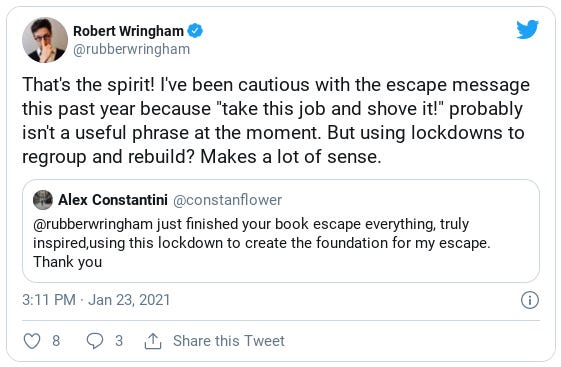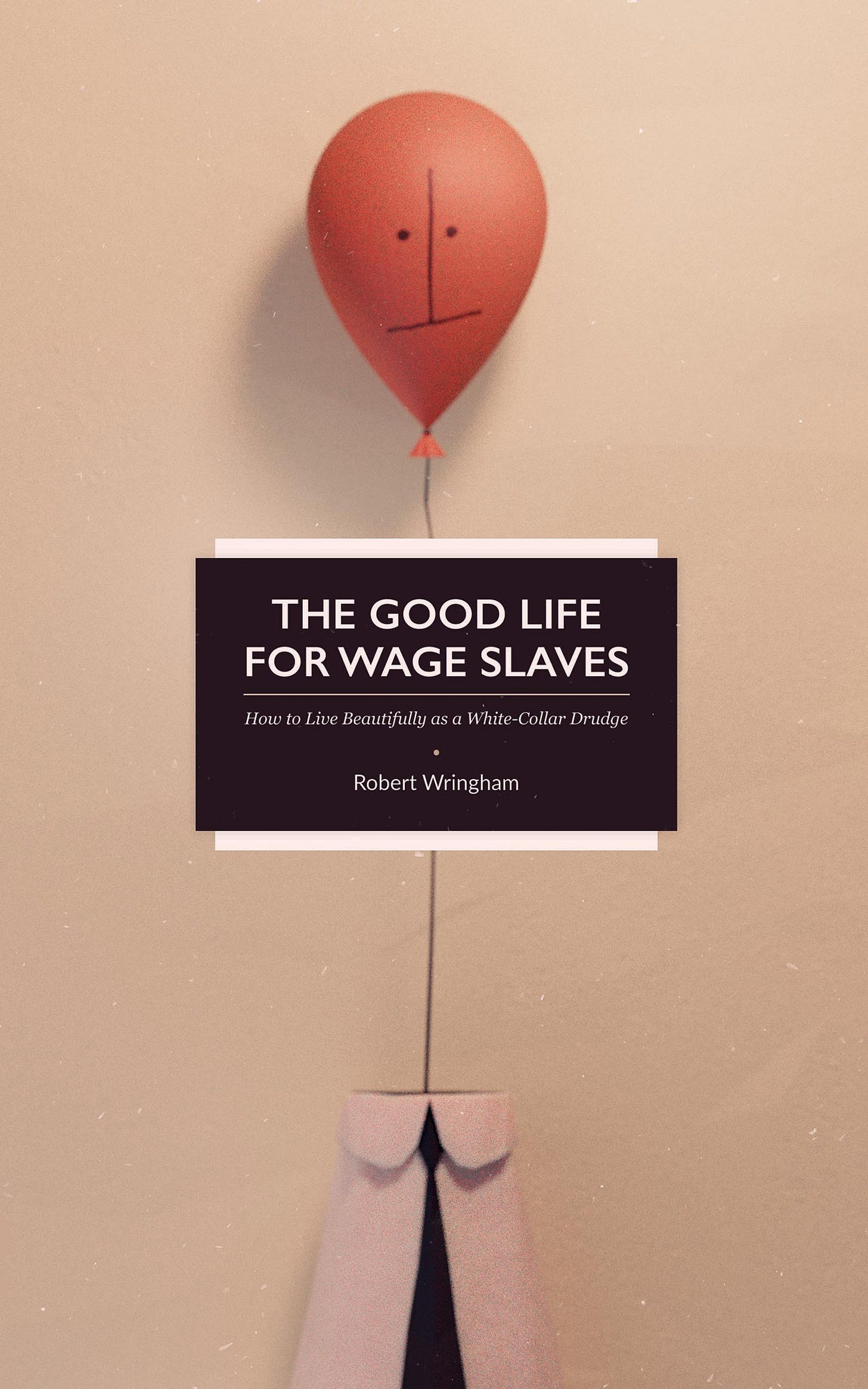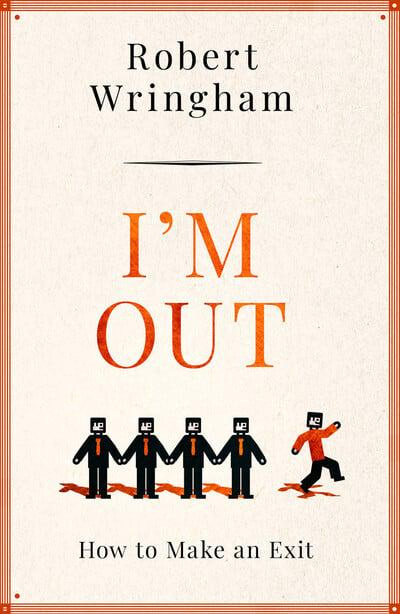New Escapologist : March 2021
Dig Deep and Reassess
My advice to anyone unsure of how to use a lockdown has been to "dig deep and reassess." It's never been a better time to conduct the "life audit" exercise I discuss in Escape Everything! and that's just what we've been doing here at Escape Towers. In our case, it's been exhaustive, but it's a bit premature to tell you about the conclusions we've arrived and what we want to do next. Maybe next time. With this in mind, our newsletter this month will be a short one.
For next month, let me know what you've been up to in lockdown along with some of your Escapological hopes and dreams, and maybe we can share some of them anonymously (or otherwise if preferred) here.
As ever, thanks for reading.
Robert Wringham
www.newescapologist.co.uk
Supervision Stands in the Way of a More Humane Workplace
There’s been a tonne of media this past year about working from home (or the oddly queasy acronym, WFH) and what it means for “the future of work.”
There’s so much of this material being generated and it’s always so wildly implausible or willing to commit to a specific vision of the future that I don’t usually bother mentioning it in New Escapologist anymore.
This piece in the Guardian isn’t bad though. It recognises the usual challenges and benefits of working from home but alights on a sensible middle-ground:
[a senior investment banker says her] ideal scenario would be to meet her team of six just once a month in the office, and she would not be afraid to challenge bosses if they asked for more. “Why would we need to do that,” she said, “with everything that we’ve proved over the past year in terms of how we’re able to conduct our business, and do it much quicker?”
and
More than half (53%) of workers said they would prefer a hybrid model in future, splitting their time equally between their desk and a remote location.
I see this as one of the big answers for making white-collar workplaces less appalling. Why not have a small office with a meeting room and a couple of quiet work booths for when people really do need to get together or to get away from home, and just let everyone else work from home (or wherever else they like) the rest of the time. Coordinate your office facilities with a simple remote booking system.
If it’s too expensive to maintain a workplace that could be empty of staff most of the time, bin the whole idea and just rent a meeting room or a co-working space once a month. God knows there’s enough of these places popping up.
Under such halfway measures, there could be a rule about replying to flagged-as-urgent email relatively quickly when you’re on the clock and a sort of “General Order 1” about delivering your projects on time regardless of your location or circumstances.
Companies should hire people they believe can work unsupervised and then trust them to do so. “The ability to work unsupervised” has been a criterion of practically every “job spec” I’ve ever seen, but in practice it rarely comes up.
This is probably the rub. The thrill of “supervision” is just irresistible to sadist managers (and maybe a few masochist workers too). And obviously it suits paranoid employers perfectly well to have a team under the heel of their expensively-hired prison guards. Supervision clearly stands in the way of a more humane future workplace.
A reader emailed me last month to say that he has not enjoyed WFH precisely because his company won’t trust him and have taken to supervising his paper-shuffling efforts through remote surveillance technologies in a way that they never did when he had an office to go to.
For the sake of the environment, our health, and common sense, the future workplace needs to be the compromise described by the Guardian article. If workplaces can’t square this circle, intelligent, potentially-useful people will just have to carry on escaping them.
Special Offers for Readers
New Escapologist's annual bill for website hosting has landed. Urgh. Any purchases made this month will greatly help with that!
£3 off Wage Slaves
THIS WEEK ONLY, you can get £3 off The Good Life for Wage Slaves when you buy it directly from the publisher's website. It's one in the eye for Amazon, will help small business and your humble narrator directly, and will bag a nice book for your shelf. Use MAR3 at checkout.
I'm Out for £4
I'm Out is Escape Everything! retitled for paperback. The publisher kindly sent a box of copies to me and I'm not really sure what to do with them other than sell them through the New Escapologist shop. The book is usually £7.99, so snap up a bargain here.
Green Escapology 1
Absolutely ages ago, I suggested a series of posts about "Green Escapology". Through working less and consuming less, Escapologists are uniquely positioned to live ecologically well. It's our default position really.
But we also have more free time than most people, more romantic temperaments, and (thanks to the avoidance of TV and popular press) we are less in thrall to the same old ideas as everyone else. With these assets under our belts, how much good can we do with our Green Escapology?
My current line thinking is that recycling and the move to Zero Waste (good practices that I would encourage) is that they focus on minimising the impact one has on the planet. This is good, but can't we do better? Minimal impact is still impact: even the most dedicated refuser of plastic carrier bags still takes something from Mother Nature.
When we recycle our beer bottles or grow some of our own veg we are indeed doing better than the unconscious consumer. But that is a very low bar. Could it be possible, for example, to compensate for the waste we have generated in the past as well as just reducing potential waste? Could we compensate for other people's impact on the planet? And, most centrally, is it possible for a single human life to give more to the planet than it takes?
I've been slightly pre-occupied with this and I've come up with two ways in which an individual might give more instead of simply minimise their impact, both of which are unfortunately a little dreary and one of which is impractical for almost anyone. We'll start with that one first:
1. Generate your own energy and give the surplus to the grid. If you own your own property, stick a solar panel on the roof, generate enough energy to meet your own needs (which, naturally, should be reduced using Minimalism), and pump the rest of it back into the grid. Whatever you produce will be used instead of more fossil fuel-derived electricity.
2. Pick up litter. This is dreary, I know, but the more I think about it, the more picking up litter strikes me as a useful and direct action against big problems. Let the very street be your interface to the world. In picking up litter, you not only correct a local eyesore: you also directly stop plastic garbage from reaching the sea. There are ambitious plans by eco-rockstars to clean up the Great Pacific Garbage Patch (jolly good) and lots of greenies like to go to the beach to intercept garbage at that point (also good) but you don't need to get into a speedboat or go all the way to the coast (causing pollution in the process) to help. Litter on land, when it is not picked up, inevitably ends up in the sea: it is washed into the storm drains, into the river, and into the sea. Pick it up now and it won't end up wrapped around a turtle's fin a few weeks from now. I've been doing this. I like to grab carrier bags and the likes but I also focus on small pieces of plastic that the professional litter pickers don't bother with: picking up pen lids and bottle caps and plastic fork prongs isn't much fun but you'll directly stop it from reaching the bellies of seabirds.
While you're on the street looking for litter, let your mind drift and see what other ideas you can come up with for positively helping the planet. Let me know what you come up and we'll report them here in a Green Escapology post.
The defining thing of Green Escapology that sets it apart from regular green efforts is that it is something you can do yourself, directly. And it isn't just about preventing waste but actively striking against the existing problems. It should be something you can do without permission and something that doesn't require mass political will. It probably shouldn't involve making or selling things either; I am not convinced that efforts to "educate people" through books and TV programmes this past 40 years has helped very much and our species is already in huge material debt.
Let me know what you come up with, my fellow Escapologists.
This turned out to be quite a long newsletter after all, didn't it? Sorry about that.
Please remember to buy a book!
Robert Wringham
www.newescapologist.co.uk







